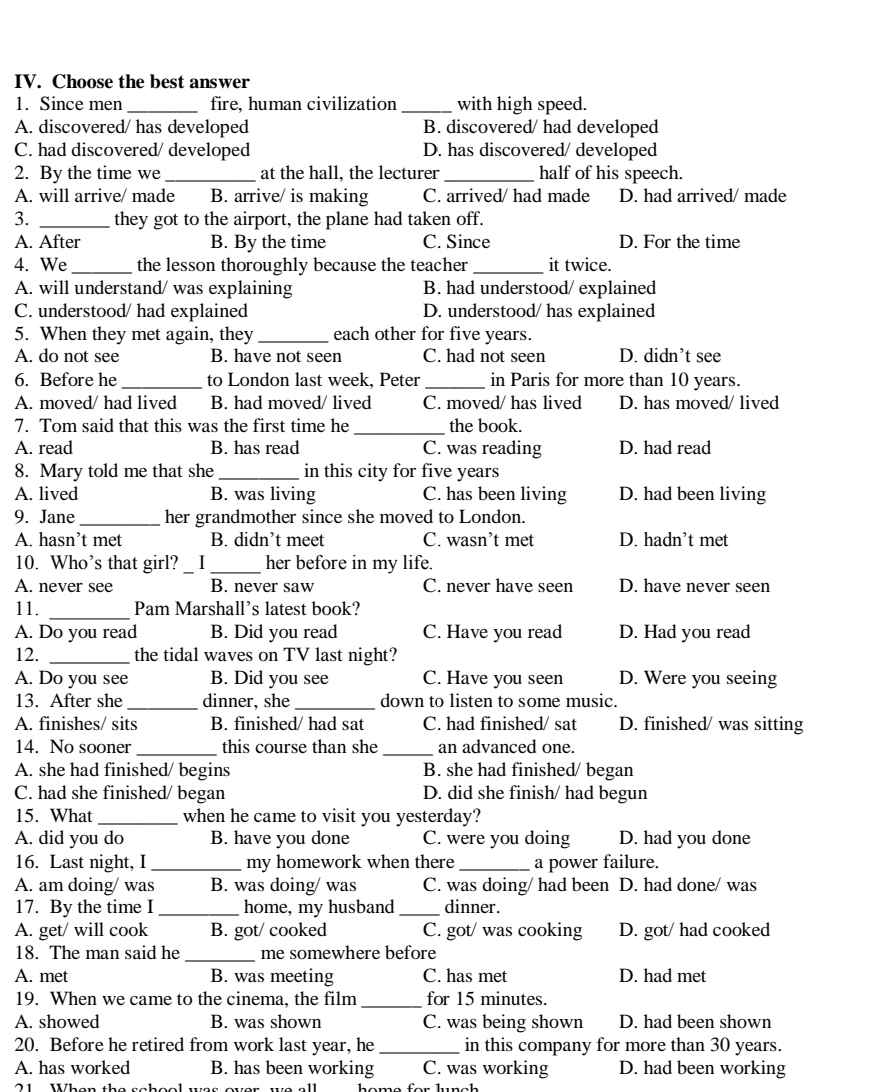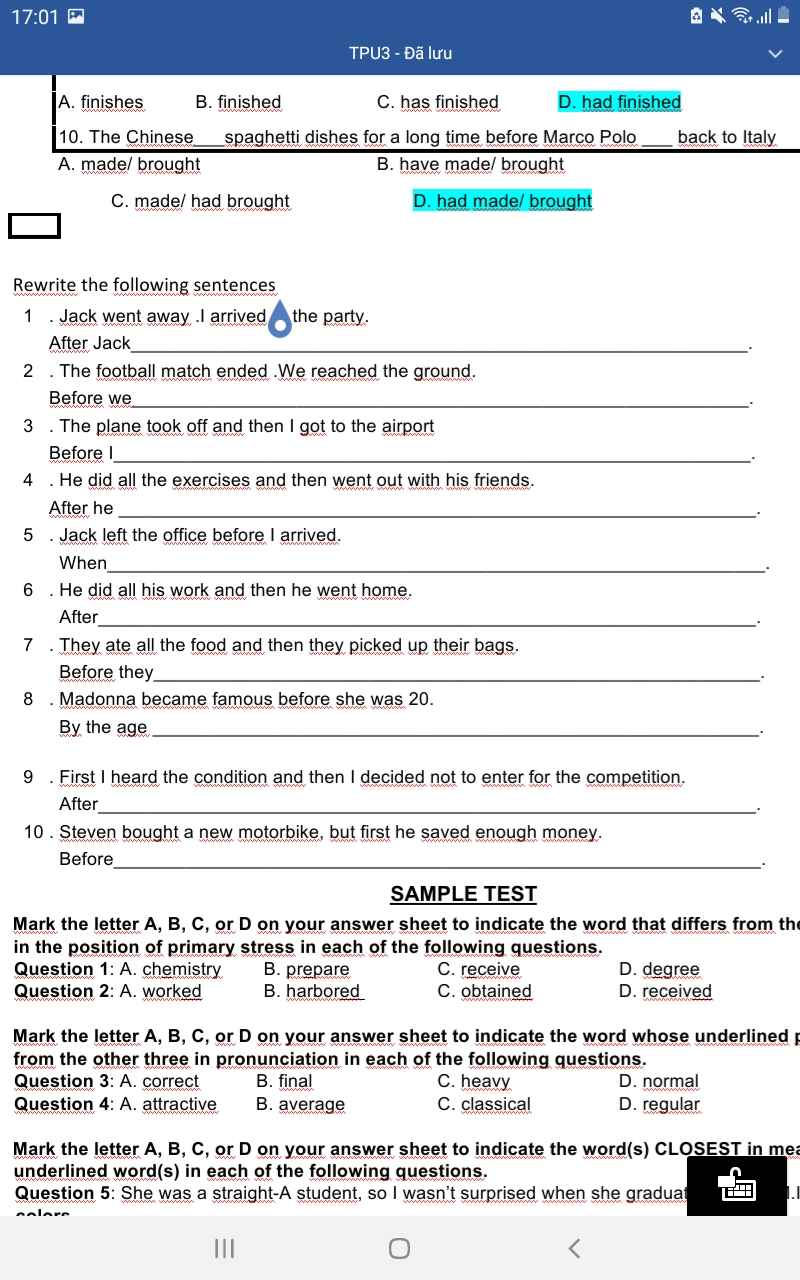write a email to your best friend to tell about your family routines
Vocabulary
1)Pete use/used to live in Australia when he was young.
2) I’ve looked everywhere/nowhere, but I can’t find my purse
3) Have/Did you ever donated blood?
4)They haven’t finished/didn’t finish the book yet.
5)We didn’t know someone/anyone at the party.
1 used
2 everywhere
3 Have
4 haven't finished
5 anyone
Đúng 1
Bình luận (0)
a - c - a - d - d - d - c - c - a - a - d
Đúng 0
Bình luận (0)
Most people relate stress to physical symptoms like an upset stomach or headaches. Research has suggested that negative emotions and thoughts may also have close links to our brain. Researchers have started finding out why we tend to remember negative things more strongly and in more detail than good ones. The brain handles positive and negative information in different parts. Negative emotions involve more thinking, and the information is processed more thoroughly. Thus, we tend to ruminate mor...
Đọc tiếp
Most people relate stress to physical symptoms like an upset stomach or headaches. Research has suggested that negative emotions and thoughts may also have close links to our brain. Researchers have started finding out why we tend to remember negative things more strongly and in more detail than good ones. "The brain handles positive and negative information in different parts. Negative emotions involve more thinking, and the information is processed more thoroughly. Thus, we tend to ruminate more about unpleasant events and use stronger words to describe them than happy ones," said Clifford Nass, a professor at Stanford University.
Rick Hanson also shares the idea that our minds naturally focus on the bad and discard the good. He stated, "negative stimuli produce more neural activity than do equally intense positive ones. They are also perceived more easily and quickly." This was obtained from his little experiment in which twenty people were asked to look at pictures showing anger or happiness. The participants could identify angry faces faster than happy ones even if it was so quickly.
In a journal article Baumeister co-authored in 2001, "Bad is Stronger Than Good", he concluded,
"bad emotions, bad parents and bad feedback have more impact than good ones." This is "a basic and wide-ranging principle of psychology". Thus, Baumeister and his colleagues noted that bad incidents, such as losing your dreamy job and breaking up with your girlfriend or boyfriend, may have a greater impact than landing a job or receiving a marriage proposaL
Part 1. Choose the best answers to complete the following sentences.
1. People have generally related stress to ______.
A. physical symptoms
B. brain damage
C. ruined relationships with other people
2. Positive events take ______ to perceive than/as negative ones.
A. less time
B. more time
C. the same amount of time
3. Positive things ______.
A. do not produce neural activity
B. produce more neural activity than negative ones
C. produce less neural activity than negative ones
4. The best title for the above text is ______.
A. Stress makes us tired
B. People try to forget bad events.
C. Bad events have stronger impacts than good ones
Part 2. Decide whether the following statements are True (T), False (F) or Not Given (NG).
1. Positive emotions are easier to be forgotten than negative ones.
2. All information is processed in the same part of the brain.
3. The more we try to forget a bad event, the more we think about it.
4. Positive thoughts protect us from stress.
5. It's a wide-ranging rule that bad events have more influence on us than good ones.
Giúp em vs ạ
Dạ mọi người giúp em với ạ.Em cảm ơn ạ
1 had gone away, I arrived at the party
2 reached the ground, the football match had ended
3 got to the airport, the plane had taken off
4 had done all the exercises, he went out with his friends
5 I arrived, Jack had left the office
6 he had done all his work, he went home
7 picked up their bags, they had eaten all the food
8 of 20, Madonna had become famous
9 I had heard the condition, I decided not to enter for the competition
10 Steven bought a new motorbike, he had saved enough money
1 A
2 A
3 A
4 A
Đúng 0
Bình luận (0)
1. B
2. C
3. C
4. D
5. B
6. D
7. B
8. D
9. A
10. A
Đúng 0
Bình luận (0)
Mog mọi ng giúp mik :)))
3. doesn't wash
4. Are
5. isn't
6. walks
7. is
8. am
9. are
10. washes
11. do (you often) get
12. Does (she) like
13. goes
14/ does (your father usually) get
15. don't go
16. aren't
17. goes
18. visit
19. Does (he) go
20. Does (she) come
V.
1. died
2. worked
3. did
4. wrote
5. bought
6. read
7. listened
8. watched
9. went
10. was
11. went
12. had
13. met
14. was
15. did ( you) do
16. studied
17. didn't visit
18. was
19. built
20. didn't come
Hoctot
Đúng 2
Bình luận (0)









